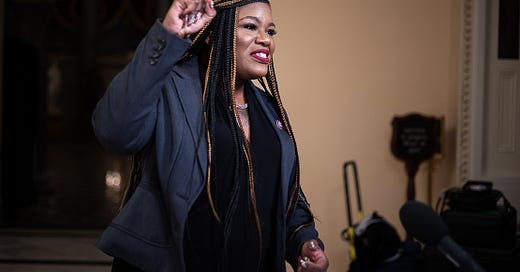Religious Groups Respond to Jan. 6
Welcome to the Faith and Politics Project! This January we’ve been reflecting on the tensions between Christian Nationalism and religious freedom. We believe that religion is beautiful and important to so many people—we like to highlight leaders who use their faith to promote helpful policies, we like to show how religion can mobilize groups of people for just causes, we like to celebrate religious communities thriving and leading the discourse against injustices in the country. Take a look at our reflections on Religious Freedom Day, how faith groups have responded to the events of January 6, and a profile on Cori Bush!
A Reflection on Religious Freedom Day 2022
One of the most troubling trends in public debates about religion is the equation of religious freedom with conservative politics. To a certain degree, I understand this connection; from Hobby Lobby to Masterpiece Cakeshop, the past few decades have brought a surge of SCOTUS cases in which discrimination is justified under religious freedom law. I am concerned, however, about the increasingly pervasive narrative that religious freedom only serves conservative Christians.
This concern materialized tragically this past weekend, coinciding with a small but important holiday—National Religious Freedom Day. Commemorating the signing of Jefferson’s Virginia Statute for Religious Freedom (a precursor to the First Amendment), Religious Freedom Day is a time to recommit ourselves to protecting the free exercise of religion and to condemn contemporary examples of religious prejudice. The holiday was founded decades ago but, to be frank, this year hit differently.
On January 14th (two days before the holiday) Biden released a statement affirming that all Americans “should feel safe when attending a religious service, school, a community center event, or while walking down the street wearing the symbols of their faith.” On January 15th, however, we were painfully reminded how far America actually is from that reality.
The hostage crisis at Congregation Beth Israel in Colleyville, Texas serves as a clear and painful reminder that, no, we do not live in a country where everyone feels safe attending a religious service. Antisemitism remains pervasive in this country and tragedies such as Colleyville demand us to reflect on why this bigotry (in addition to other forms of religious prejudice) persists in our society. Why does religious freedom—like so many of America’s founding ideals—remain an unrealized dream?
Like many progressives, I am frustrated by communities and corporations who try to justify discrimination through the guise of religious freedom rhetoric. But this is not the sole use of religious freedom law. The truth is that many religious minorities experience harassment, surveillance, and violence on a regular basis. By approaching religious freedom as synonymous with conservative Christian interests, we only further their so-called monopoly on religious identity.
This National Religious Freedom Day, let us consider how to nuance our conversations about religious freedom in progressive spaces. Only with this first step can we become genuine advocates for our own religious communities and neighbors.
Religion in the News: Democracy
Christians Have a Role to Play in Defending U.S. Democracy by Guthrie Graves-Fitzsimmons, Center for American Progress
“The question shouldn’t be whether Christians are called to be engaged in politics but of how we engage. Following Christ has profound political, economic, and social implications. Participating in our democratic system, to protect the most vulnerable and to promote justice, is integral to Christian discipleship. That being said, we should engage in politics in ways that prioritize our faith values, such as a commitment to loving our enemies, which feels particularly timely and revolutionary in our currently polarized and so often vitriolic politics.”
The state of unity, democracy and religion in the U.S. since President Biden took office, conversation between the Most Rev. Michael Bruce Curry and Jon Meacham, WBUR
One year after Jan. 6, what’s changed for faith groups? by Mya Jaradat, Deseret News
“The Rev. Wyatt said the book was framed around a simple question: ‘If I want to be a faithful Christian, what do I need to look like as a citizen?’ Following biblical principles, like caring for one’s neighbor, can also serve as healthy patriotism.
While nationalism leads people to sacrifice their religious values, patriotism encourages citizens to bring their values to the public square in a way that could potentially benefit all citizens and uphold democracy, Tyler said.
‘You can still be patriotic and can rely on your faith and religious values to question your country,” she said. ‘That is a healthy sense of patriotism.’”
Faith in Action Profile: Cori Bush
You may know Cori Bush as the newest member of “the squad,” or as the registered nurse-turned-politician who defeated a 10-term incumbent to become the first Black woman to represent Missouri in Congress. But you may not know that she is also an ordained pastor, and that she even founded her own church in St. Louis. Citing her background as a preschool teacher and having experienced homelessness, she says she asked herself: “Who speaks up for people like me?...Why do I keep having to live like this?” Those questions led her drive change in her community as a faith leader, and later, after the 2020 murder of George Floyd, as a candidate for Congress.
Learn more about Cori Bush, her activism, her faith, and her courage at the National Women’s History Museum.
Jobs
Director Of Programs - Federation of Protestant Welfare Agencies
Social Justice & Cultural Organizer - Boston Workers Circle
Multiple Positions - Bend the Arc
Multiple Positions - J Street
Multiple Positions - Faith in Action
Multiple Positions - Council on American-Islamic Relations
People and Culture Director - Faith in Public Life
Thank you for reading. Faith & Politics Project grows through word of mouth. Please consider sharing this post with someone who might appreciate it.




